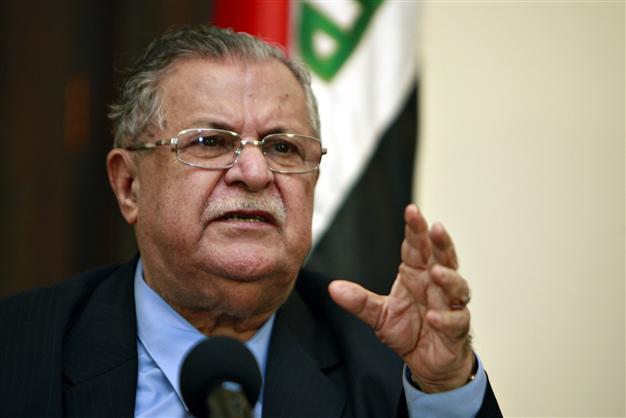Iraq's President Talabani to return from medical exile amid crisis
SULAIMANIYAH, Iraq - Agence France-Presse

A file picture taken on March 02, 2009 shows Iraqi President Jalal Talabani speaking during a joint press conference in Baghdad. AFP Photo
Iraqi President Jalal Talabani was to return from months of treatment abroad, with his crisis-hit country on the brink of breakup but his native Kurdistan buoyant with statehood hopes."President Talabani is coming home on Saturday July 19 after receiving successful health treatment in brotherly Germany," his Patriotic Union of Kurdistan said on Friday.
The PUK said Talabani, due to fly into his Kurdish fiefdom of Sulaimaniyah, would resume his duties as head of state, in a statement also confirmed to AFP by his son Qubad.
While most of Iraq's political power lies with the prime minister's office, the 80-year-old Talabani was long seen as a key mediator between Iraq's feuding factions.
But many observers now cast him off as a spent force, both physically and politically, with his long-time rival Massud Barzani presiding over the destiny of the autonomous Kurdish Regional Government.
Talabani will return to Iraq on the eve of a deadline for parliament's various blocs to agree on candidates for his job, the latest step in what has been a protracted and tumultuous process to renew Iraq's leadership following April elections.
However there was little expectation the veteran Kurdish leader would seek another term.
"I really do think this is a post-Talabani era. I've stuck my neck out there, but I haven't heard any Iraqis talking about him in any way being president," said Toby Dodge, director of the London School of Economics' Middle East centre.
As part of an unofficial power-sharing deal struck in the aftermath of the US-led invasion of Iraq in 2003, the post of president goes to a Kurd, that of prime minister to a Shiite and of parliament speaker to a Sunni Arab.
Iraq's minority Kurds, who have enjoyed autonomy from Baghdad for more than two decades, significantly enlarged the size of their would-be independent state last month when they seized long disputed territory.
The highly-efficient peshmerga force took advantage of the vacuum left by federal troops retreating in the face of a lightning offensive launched on June 9 by jihadist-led Sunni militants.
As the Islamic State group conquered large swathes of land in Iraq north and west, peshmerga units took control of the city of Kirkuk and several neighbouring oil fields, both seen as essential in Kurdish dreams of statehood.
Barzani, who once fought a bitter internecine war against Talabani for supremacy in the Kurdish struggle, has blamed Prime Minister Nuri al-Maliki's Shiite-dominated government for the collapse of the Iraqi army and the rise of sectarian tension.
Maliki has accused the Kurds of undermining national unity, taking advantage of an offensive by a group known as the most extreme in the recent history of global jihad and even of harbouring some its operatives.
It was unclear to what extent Talabani's return could weigh in on the latest crisis, which the United Nations says has left thousands of civilians dead and forced more than 600,000 people to flee their homes.
However, he could help de-escalate tensions between Baghdad and Kurdistan by tempering Kurdish ambitions for a referendum on independence, following calls earlier this month by Barzani to prepare for one.
Iraqi neighbour Turkey is said to have softened its stance towards the idea of an independent Kurdish state, but fellow neighbour Shiite Iran is unlikely to condone the breakup of Shiite majority Iraq.
"Talabani was the key interlocutor between Iran, Kurdish politics and Baghdad," Dodge said.
"So Talabani's return may well be the Iranians encouraging the PUK to step up and fight against Barzani's independence plans."
















